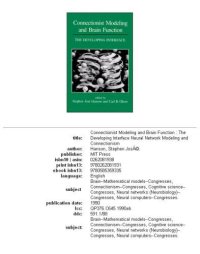
Ebook: Connectionist modeling and brain function: the developing interface
Author: Stephen José Hanson
Bringing together contributions in biology, neuroscience, computer science, physics, and psychology, this book offers a solid tutorial on current research activity in connectionist-inspired biology-based modeling. It describes specific experimental approaches and also confronts general issues related to learning associative memory, and sensorimotor development. Introductory chapters by editors Hanson and Olson, along with Terrence Sejnowski, Christof Koch, and Patricia S. Churchland, provide an overview of computational neuroscience, establish the distinction between "realistic" brain models and "simplified" brain models, provide specific examples of each, and explain why each approach might be appropriate in a given context. The remaining chapters are organized so that material on the anatomy and physiology of a specific part of the brain precedes the presentation of modeling studies. The modeling itself ranges from simplified models to more realistic models and provides examples of constraints arising from known brain detail as well as choices modelers face when including or excluding such constraints. There are three sections, each focused on a key area where biology and models have converged. Stephen Jos? Hanson is Member of Technical Staff, Bellcore, and Visiting Faculty, Cognitive Science Laboratory, Princeton University. Carl R. Olson is Assistant Professor, Department of Psychology at Princeton Connectionist Modeling and Brain Function is included in the Network Modeling and Connectionism series, edited by Jeffrey Elman.
Download the book Connectionist modeling and brain function: the developing interface for free or read online
Continue reading on any device:

Last viewed books
Related books
{related-news}
Comments (0)